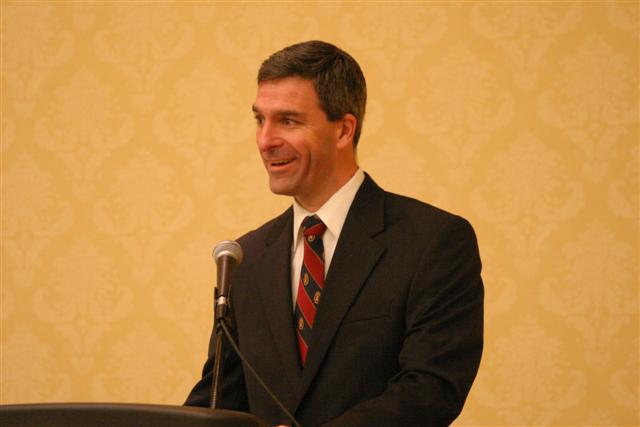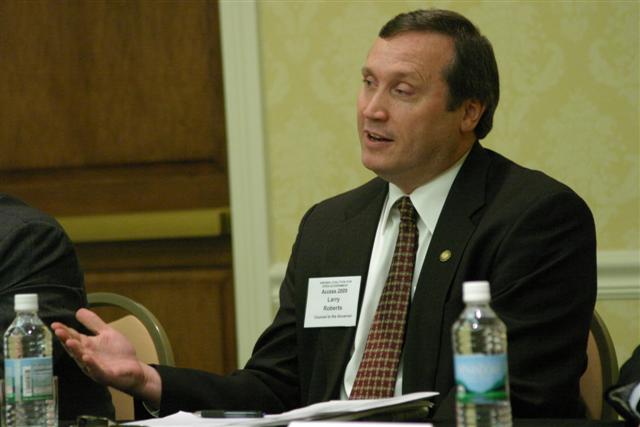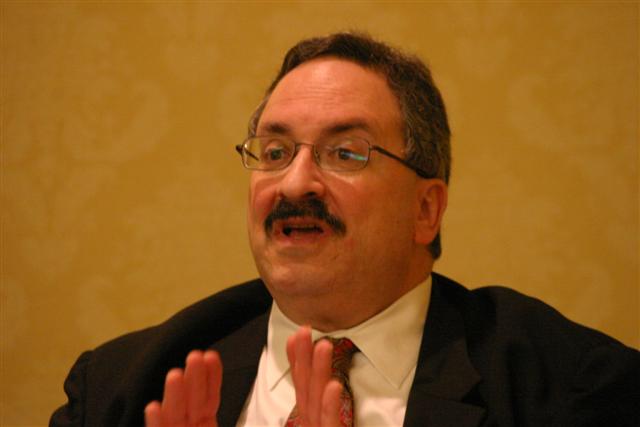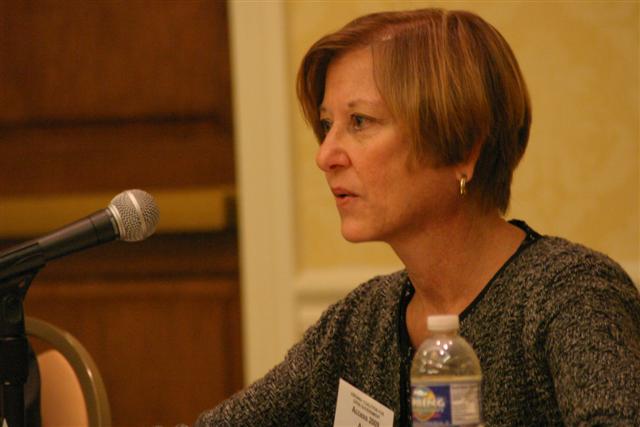More than 70 people attended the Virginia Coalition for Open Government’s 10th conference, Access 2009, at the historic Stonewall Jackson Hotel in Staunton.
Attorney General-elect, Ken Cuccinelli (right) , then a candidate, spoke to the group on Oct. 16, and more than a dozen panelists and moderators covered a range of topics: from FOIA basics and judicial selection, to anonymous juries and transparency in the Obama administration.
, then a candidate, spoke to the group on Oct. 16, and more than a dozen panelists and moderators covered a range of topics: from FOIA basics and judicial selection, to anonymous juries and transparency in the Obama administration.
Cuccinelli promised that if elected, he would post the Attorney General’s budget online. He also spoke of having an “ah-ha” moment when news broke that then-Del. Phil Hamilton, R-Newport News, had negotiated a job at an Old Dominion University training center while seeking funding for it in the General Assembly. Cuccinelli thought Hamilton might have thought longer and harder about what he was doing if the budget process were more open.
In the FOIA basics panel, Lee Wolverton of the Waynesboro News Virginian noted that for journalists, it’s often more important to get as much of a story as possible before having to resort to FOIA, while Chris Graham of the Augusta Free Press lamented how some government employees feel territorial about the records in their possession, and how some feel personally attacked when someone requests those records.
FOI Advisory Council Director Maria Everett said she had the same feeling of reluctance to turn over records the first time her office was sent a FOIA request for the names of people who came to her FOIA “road show” training sessions.
The panel was led by McGregor McCance, managing editor of the Daily Progress.
During the judicial selection panel, Richmond trial attorney Coleman Allen told the audience that he has seen both good and bad judges while practicing in Virginia, which appoints judges, and West Virginia, which elects them. Each judicial-selection method, in his opinion, has its own merits and drawbacks.
Larry Roberts (left) , currently counselor to Tim Kaine as Democratic National Committee chair and previously counselor to Tim Kaine as governor, said he appreciated the power the governor has to fill certain appointments without legislative approval, but also said it wasn’t the time to put all judicial appointments into the governor’s hands.
, currently counselor to Tim Kaine as Democratic National Committee chair and previously counselor to Tim Kaine as governor, said he appreciated the power the governor has to fill certain appointments without legislative approval, but also said it wasn’t the time to put all judicial appointments into the governor’s hands.
Retiring Staunton delegate Chris Saxman agreed, noting there was little to no likelihood of the General Assembly giving up its current power to interview and recommend candidates.
Fairfax County Clerk of Court John Frey discussed how bad judges can sometimes stay on the bench too long. He noted that an adjusted pension-accrual process may be a way to lure older lawyers with more court (and life) experience to the bench.
Tom Moncure, general counsel at George Mason University, moderated the panel.
Perhaps the liveliest panel of the day was the first one, where a defense attorney, Kristie Kane, a prosecutor, Matt Britton, and a judge, Clifford Weckstein (right) , sparred over the propriety of a Supreme Court advisory committee’s proposal to make juror names anonymous in all criminal cases.
, sparred over the propriety of a Supreme Court advisory committee’s proposal to make juror names anonymous in all criminal cases.
Questioning the public’s true need to know a juror’s name, Britton noted how jurors legitimately fear retaliation for the decisions they render.
Weckstein countered that the existence of a few incidents of threats against jurors was not enough to overcome the public’s fundamental right of access to public trials.
(Note, in November, the rules advisory committee withdrew the proposal discussed at the conference. See related story – 5th item)
Kane added that a defendant cannot be tried by a jury of his peers if he does not know who they are.
Dick Hammerstrom of the Free Lance-Star moderated the panel.
There was near-universal agreement among the three panelists examining transparency in the Obama administration that promises of openness were largely unfilled at that point.
Roger Strother of OMB Watch, Patrice McDermott of OpenTheGovernment.com, and Anne Weismann (left)  of Citizens for Ethics and Responsibility in Washington, all expressed disappointment in Obama’s continuation of prior administration secrecy policies on detainee-abuse photos, state secrets privilege, and access to White House logs. (Obama issued an Open Government Directive Dec. 8, requiring, among other things, for agencies to decrease their FOIA backlogs by 10 percent each year. See related story, page 5.)
of Citizens for Ethics and Responsibility in Washington, all expressed disappointment in Obama’s continuation of prior administration secrecy policies on detainee-abuse photos, state secrets privilege, and access to White House logs. (Obama issued an Open Government Directive Dec. 8, requiring, among other things, for agencies to decrease their FOIA backlogs by 10 percent each year. See related story, page 5.)
Ed Jones, editor of the Free Lance-Star, moderated the panel.
VCOG’s 2010 conference will be held in the Richmond area.